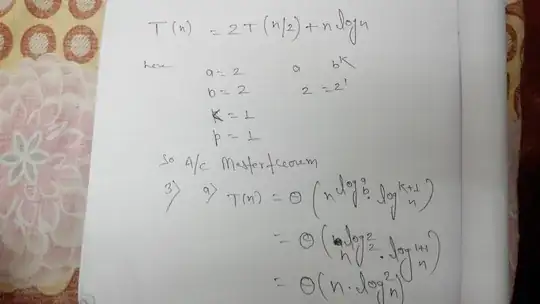How can I solve the recurrence relation $T(n) = 2T(n/2) + n\log n$? It almost matches the Master Theorem except for the $n\log n$ part.
Asked
Active
Viewed 1.4e+01k times
22
-
Similar question on cs.SE. – Raphael Jun 18 '12 at 18:26
-
It satisfies the Case 2 of Master Theorem Case 2: f(n) = Theta O(n^log_b(a) (log_2(n))^k ) for some k >= 0 T(n) = O(n^log_b(a) (log_2(n))^(k+1) ) In our case f(n) = n^(log_2(2)) (log n) ^ 1, Hence k = 1 T(n) = Theta O(n (log_2(n) ) ^ 2) – vCillusion Mar 23 '16 at 11:02
-
Master theorem doesn't cover cases where the leftmost function isn't a polynomial. n log n is bounded by n^2, but it doesn't give a theta bound then. – mlanier Jan 26 '21 at 19:40
2 Answers
18
Let us take $n = 2^m$. Then we have the recurrence $$T(2^m) = 2T(2^{m-1}) + 2^m \log_2(2^m) = 2T(2^{m-1}) + m 2^m$$ Calling $T(2^m)$ as $f(m)$, we get that \begin{align} f(m) & = 2 f(m-1) + m 2^m\\ & = 2(2f(m-2) + (m-1)2^{m-1}) + m2^m\\ & = 4f(m-2) + (m-1)2^m + m2^m\\ & = 4(2f(m-3) +(m-2)2^{m-2}) + (m-1)2^m + m2^m\\ & = 8f(m-3) +(m-2)2^m + (m-1)2^m + m2^m\\ \end{align} Proceeding on these lines, we get that \begin{align} f(m) &= 2^m f(0) + 2^m (1+2+3+\cdots+m) = 2^m f(0) + \dfrac{m(m+1)}{2}2^m\\ & = 2^m f(0) + m(m+1)2^{m-1} \end{align} Hence, $T(n) = n T(1) + n \left(\dfrac{\log_2(n) (1+\log_2(n))}{2} \right) = \mathcal{\Theta}(n \log^2 n)$.
-
Thank you. But if $T(2^m) = f(m)$, then isn't $T(2^{m-1}) = f(m/2)$ ? How do you get $f(m-1)$? – cody Jun 18 '12 at 01:31
-
1@cody $T(2^m) = f(m)$. Now replace $m$ by $m-1$, we then get $T(2^{m-1}) = f(m-1)$. – Jun 18 '12 at 01:41
-
I see. Thank you. So the trick to these recurrence relation is to transform them from the T(.) form to one of the summation series, right? – cody Jun 18 '12 at 02:01
-
-
1

 the given problem is best fit on master theorem
the given problem is best fit on master theorem
Naveen Kumar
- 59
-
1You just wrote the formulas, how is this an answer? And this problem isn't satisfied by the master theorem, so that's wrong too. – Mercury Oct 08 '20 at 16:29